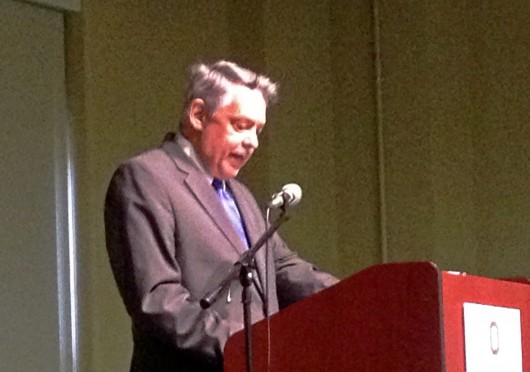
Juan Gonzalez, a journalist for the New York Daily News and a Latino activist, speaks Oct. 20 at Hale Hall as part of a series for the 50th anniversary of the passage of the 1965 Immigration and Nationality Act. Credit: Lee McClory / Design editor
The United States might be the cause and the solution for Latin American immigration issues, one activist said.
That’s the argument Juan Gonzalez, a reporter and a columnist for the New York Daily News and an activist for Latino rights, made on Monday to about 30 students and faculty in Hale Hall as part of a series for the 50th anniversary of the passage of the Immigration and Nationality Act of 1965.
Gonzalez, who has written two books on immigration policy and underprivileged groups, “Harvest of Empire: A History of Latinos in America” and “News for All the People: The Epic Story of Race and the American Media,” argued not only had the U.S. started the immigration problem, but could also be the solution.
Gonzalez said there has been a long history of problems with immigration in America, and there rarely is a period in U.S. history without a group marginalized in some way. Groups as diverse as Irish, Chinese, Germans, Africans and Latin Americans have been discriminated against with immigration laws and forced labor, he said.
“It wasn’t right, but it was the law. The single lesson we should draw from these policies is that what is right and what is law are different,” Gonzalez said.
But the real problem, Gonzalez said, was money. The main reason so many people from Latin America want to come to the United States is because the U.S. has money and jobs, but if there was a way to get money and jobs to these countries, he argued, there wouldn’t be an immigration crisis.
“The U.S. could in one way be more flexible in terms of trade policies, so that Mexico or another country feels a need to protect certain industries and to protect employment,” Gonzalez said. “Because generally speaking, local industry pays its workers better, and usually has better situations, than a lot of the workers who work in the maquilas (factories) where most of the foreign capital is.”
Some students said they found this part of his talk the most interesting, even looking at it from two different perspectives.
Ian Cheatwood, a second-year in computer science and engineering, said he thought the most interesting part was how the U.S. makes money from Mexico, but doesn’t actually pay Mexican workers very much.
“The way he framed it was interesting, I’m a computer science major, so I like to think of things logically, and that just doesn’t make sense to me,” he said.
However, Cheatwood disagreed with part of what Gonzalez said about U.S. companies making a lot of money off cheap labor in Mexico, pointing out that China makes the largest amount of money from making American products.
Maria Prasek, a second-year in international studies and public affairs, said she also found the economic argument compelling, but for a different reason.
“It’s a different approach of the issue,” she said. “It’s a trade issue and wage issue in Mexico. I’ve had a couple classes talk about immigration as an issue, but this is a new solution.”
While Gonzalez is only one scholar in a wide diversity of scholars, Lilia Fernández, associate professor in the Department of History and a faculty affiliate on Latino/a Studies, said many of the arguments different scholars make resonate with each other, even if the focus or the interpretation differs slightly. These scholars come to similar conclusions, she said.
“For the most part, his analysis is very accurate in terms of immigration policy,” Fernandez, who helped organize the event, said.
But the main immigration reform Gonzalez pushed for in his speech was economic reform.
“As long as the wealth gap continues between the West, and North and South, the immigrants will still come,” Gonzalez said.


